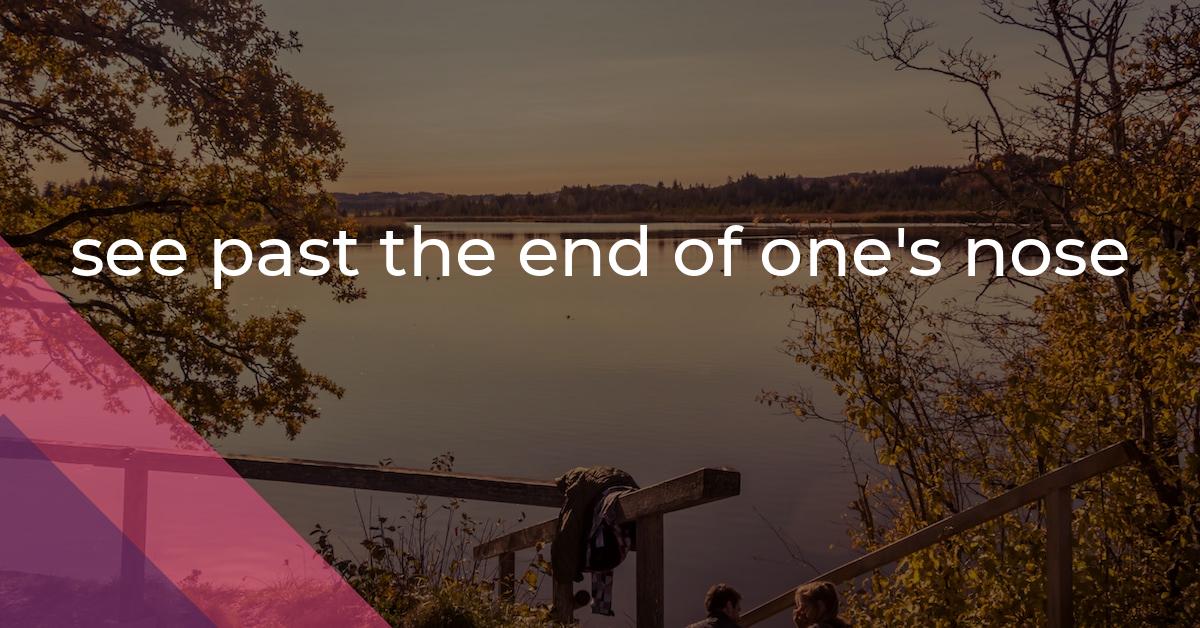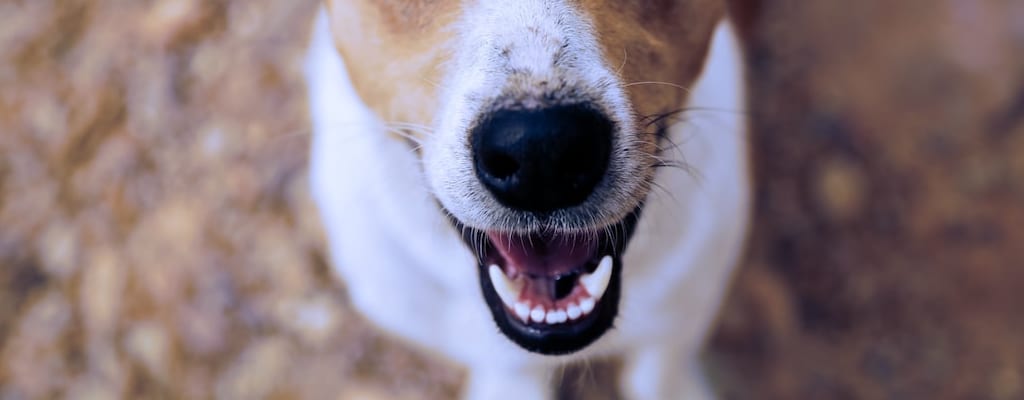see past the end of one’s nose: Idiom Meaning and Origin
What does ‘see past the end of one's nose’ mean?
The idiom see past the end of one's nose means to have limited awareness or understanding, focusing only on immediate or narrow perspectives without considering the bigger picture or alternative viewpoints.

Idiom Explorer
The idiom "the nose knows" means that one's sense of smell can accurately detect or recognize something, even when other senses or evidence may be lacking.
The idiom "see into a millstone" means to have great insight or perception, being able to understand even the smallest details or hidden motives in a situation or person.
The idiom "seeing is believing" means that someone is more likely to believe something when they see it with their own eyes, rather than simply hearing about it or being told about it by someone else.
The idiom "see daylight" means to find a solution, typically after a period of confusion or difficulty. It implies a sudden understanding or clarity in a situation, often leading to a resolution or breakthrough.
The idiom "see a man" means to fully understand or comprehend something after witnessing it firsthand.
The idiom "scratch the surface" means to only uncover or reveal a small part or a superficial level of something, without fully understanding or exploring its depth or complexity.
The idiom "run past" means to quickly mention or discuss something without going into detail or providing much information.
The idiom "rose-colored glasses" refers to a positive and optimistic perspective or viewpoint.
The idiom "rear one's head" means to appear or become evident after a period of inactivity or hiding.
Surprising Secrets Unveiled
The idiom "see past the end of one's nose" is a figurative expression that conveys the idea of looking beyond one's immediate situation or limited perspective in order to gain a broader understanding of a situation or to consider alternative possibilities. This idiom is commonly used in English-speaking countries, including the United States, and has its origins in the 17th century.
The phrase "see past the end of one's nose" is derived from the literal act of seeing. The nose is a prominent feature on the face and serves as a physical barrier to one's vision. Therefore, if someone is only able to see up to the end of their own nose, it implies that their field of view or perspective is extremely limited. This idiom suggests that a person should strive to see beyond their immediate surroundings and consider a wider range of possibilities.
The idiom can be used in various contexts and situations. For example, it can be applied to encourage someone to think beyond their own biases or preconceptions, to consider alternative viewpoints, or to be open to different perspectives. It highlights the importance of being able to think critically and objectively, rather than relying solely on one's own limited outlook.
When we are so focused on what is immediately in front of us, like a target within arm's reach, it can be challenging to see past the end of our nose. However, by broadening our vision and considering a wider range of possibilities, we can gain a more comprehensive understanding of a situation and make more informed decisions. This idiom serves as a reminder that by looking beyond our immediate surroundings, we can develop a more well-rounded perspective.
Furthermore, the idiom can also be interpreted as a reminder to not be overly self-centered or focused solely on one's own needs and desires. When we are only concerned with ourselves, it can be difficult to consider the perspectives and needs of others. However, by taking the time to see past the end of our nose, we can develop a greater sense of empathy and understanding for those around us. This idiom encourages us to consider the bigger picture and to be mindful of how our actions and decisions impact others.
A related idiom is "in front of one's nose". This phrase is used to describe something that is very obvious or easily seen. It signifies that something is so close or apparent that it should be immediately noticeable, as if it is right in front of our nose. This idiom emphasizes the importance of being aware of our surroundings and paying attention to the obvious, rather than being oblivious or oblivious to what is right in front of us. When we are able to see past the end of our nose, we can also recognize what is right in front of us and make better decisions based on that awareness.
The idiom "the nose knows" is another related expression. It suggests that our instincts or intuition can guide us in making decisions or recognizing certain things. Our nose is often associated with the sense of smell, which can alert us to potential dangers or indicate when something is not right. By trusting our instincts and being aware of our gut feelings, we can see past the end of our nose and make choices that are in our best interest.
Another related idiom is "look down one's nose". This phrase is used to describe someone who is condescending or looks down on others. It conveys the image of someone tilting their head back slightly and looking down their nose at someone, indicating a sense of superiority or disdain. When we only see up to the end of our own nose, we may develop a narrow-minded or judgmental perspective, looking down on others instead of trying to understand their point of view. By seeing past the end of our nose, we can avoid being judgmental and cultivate a more open-minded and inclusive attitude towards others.
The idiom "see one's way clear to" is also related to "see past the end of one's nose". It suggests being able to envision a path or course of action that is clear and achievable. When we are only able to see up to the end of our own nose, it can be difficult to see a way forward or to find a solution to a problem. However, by expanding our perspective and considering different possibilities, we can see our way clear to a solution or a better outcome. This idiom encourages us to think creatively and identify opportunities that may not be immediately apparent.
Lastly, there is the idiom "put it past". This phrase is used to express doubt or skepticism about someone's actions or intentions. When we are only able to see up to the end of our own nose, we may be more inclined to trust our own judgment and be skeptical of others. However, by seeing past the end of our own nose, we can become more open to considering different viewpoints and giving others the benefit of the doubt. This idiom reminds us to be mindful of our own biases and to avoid jumping to conclusions without considering all the available information.
Overall, the idiom "see past the end of one's nose" serves as a metaphorical reminder to expand one's perspective and consider different possibilities. By doing so, individuals can overcome their limited views and gain a greater understanding of the world around them. While the phrase itself may seem straightforward, its implications and applications are far-reaching, making it a valuable idiom to consider and reflect upon.
Example usage
Examples of how the idiom "see past the end of one's nose" can be used in a sentence:
- He is so focused on his own problems that he can't see past the end of his nose when it comes to helping others.
- She is a visionary leader who can see past the end of her nose and make long-term decisions for the company.
- Don't just think about your immediate needs; try to see past the end of your nose and consider the consequences of your actions.
More "perspective" idioms



